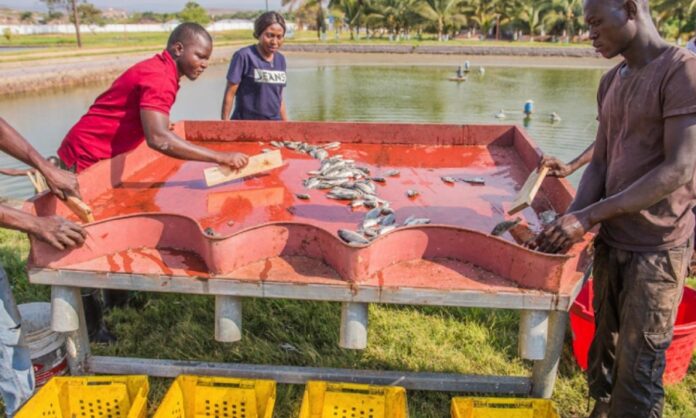A recent study by Chipfakacha, C. T. (2024) titled “Aquaculture: The New Way of Creating Sustainable Livelihoods Among Rural Populations in Africa. A Case of Seke Rural District Zimbabwe” published in the International Journal of Agricultural Extension and Rural Development Studies, shows that aquaculture has provided a sustainable livelihood for rural populations, especially in areas affected by drought and poor harvests.
Aquaculture, particularly fish farming, is emerging as a sustainable and vital livelihood for rural communities in Zimbabwe, with the Seke Rural District serving as a prime example of this transformative industry. This burgeoning sector is not only providing a new source of income for many households but also playing a crucial role in enhancing food security and nutrition in the region.
“
Aquaculture in Seke Rural District, Zimbabwe, is providing sustainable livelihoods, improving food security, and creating economic opportunities for rural communities.– Chipfakacha, C. T. 2024
Economic and Nutritional Benefits
Fish farming offers substantial economic benefits by creating jobs and generating income for rural populations. Many families in Seke have embraced aquaculture as a viable alternative to traditional farming, which is often hampered by unpredictable weather patterns and land degradation. Fish farming, on the other hand, is less dependent on climatic conditions and offers a more reliable source of income. Additionally, the practice of aquaculture significantly contributes to dietary supplementation by providing a readily available source of protein. In regions where malnutrition is a pressing concern, the inclusion of fish in the local diet is invaluable.
Challenges Facing Aquaculture
However, the expansion of aquaculture in Zimbabwe is not without challenges. One of the most pressing issues is the availability of water. Sustainable fish farming requires consistent water sources, but many rural areas, including Seke, face water scarcity. This challenge is exacerbated by the effects of climate change, which has led to reduced rainfall and shrinking water bodies. Another significant hurdle is the lack of proper training and technical knowledge among fish farmers. Without adequate expertise, many farmers struggle to maintain healthy fish stocks and maximize their yields, leading to losses and discouragement.
Role of Government and NGOs
Recognizing the potential of aquaculture to uplift rural economies and improve food security, both the government and non-governmental organizations (NGOs) have been actively promoting this sector. Their efforts include providing funding to support the establishment and expansion of fish farms, as well as offering training programs to equip farmers with the necessary skills and knowledge. These initiatives are crucial in helping farmers overcome the challenges they face, particularly in terms of water management and technical know-how.
How the study was conducted
The author interviewed local fish farmers, government officials, and NGO representatives to gather qualitative data on the impact and challenges of aquaculture in the region. The author employed quantitative data on fish production, income levels, and employment rates among the rural population involved in aquaculture. The author engaged in participant observation, spending time with the fish farmers to understand their daily activities, practices, and the overall aquaculture process. These methods helped provide a comprehensive understanding of how aquaculture is contributing to sustainable livelihoods in Seke Rural District.
What the authors found
The author found that aquaculture has provided a sustainable livelihood for rural populations, especially in areas affected by drought and poor harvests. Fish farming has supplemented diets with high-protein fish, offering a healthier alternative to red meat. The study posits that the practice has created jobs, particularly for the youth, who are involved in pond construction and maintenance as well as helped utilize idle land throughout the year, making it a viable alternative to traditional seasonal farming.
Why is this important?
Sustainable Development: It highlights how aquaculture can be a sustainable livelihood option, especially in regions facing agricultural challenges due to climate change.
Economic Empowerment: By creating jobs and generating income, aquaculture helps alleviate poverty and improve the economic status of rural communities.
Nutritional Improvement: The introduction of fish farming provides a reliable source of protein, enhancing the nutritional intake of the local population.
Resource Utilization: It demonstrates effective use of idle land and water resources, promoting efficient land management practices.
Policy Implications: The findings can inform government and NGO policies, encouraging support and investment in aquaculture as a viable development strategy. Understanding these aspects can help replicate the success of aquaculture in other regions, contributing to broader sustainable development goals.
What the authors recommended
- The author suggests that governments should provide subsidies, low-interest loans, and grants to support the initial setup and ongoing operations of aquaculture farms.
- The study advocates implementing comprehensive training programs for farmers on best practices, disease management, and sustainable techniques.
- The author recommends the government invest in essential infrastructure such as hatcheries, feed mills, and cold storage facilities to support the aquaculture supply chain.
- The study suggests that the government should fund research to improve fish breeds, feed quality, and disease resistance, as well as to develop innovative farming techniques.
- The government should create policies that facilitate better market access for aquaculture products, including export incentives and local market development.
In conclusion, aquaculture has proven to be a transformative force in Seke Rural District, Zimbabwe, offering a sustainable and reliable livelihood for rural populations. By providing economic empowerment, enhancing food security, and effectively utilizing natural resources, fish farming addresses the challenges posed by climate change and declining agricultural productivity. However, to fully realize its potential, ongoing support from the government, NGOs, and the local community is essential. With the right investments and training, aquaculture could become a cornerstone of rural development, not only in Zimbabwe but across Africa.
















 The African Research (AR) Index is a comprehensive scholarly directory and database focused explicitly on journal publishers that publish and disseminate African research.
The African Research (AR) Index is a comprehensive scholarly directory and database focused explicitly on journal publishers that publish and disseminate African research.

